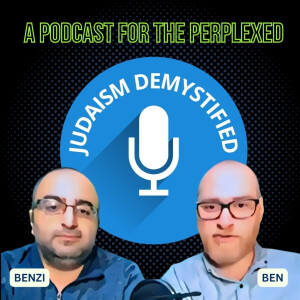
JUDAISM DEMYSTIFIED | A Guide for Today's Perplexed: Confronting the Challenges of This Generation
Religion & Spirituality:Judaism

Episode 42: Rabbi Mark Wildes "Kiruv for the Next Generation"
 2023-02-03
2023-02-03
Download
Right click and do "save link as"
Rabbi Mark Wildes shares his journey in Kiruv and delves into the reasons behind the lack of engagement of many Jews with Judaism. He argues that a lack of proper Jewish education is a major contributor to this and that many people are not turning away from their faith, but simply never had it instilled in them in the first place. What can Ashkenazim and Sephardim learn from each other in terms of how we deal with these matters? Rabbi Wildes sheds light on the current state of Kiruv, which is largely Haredi or Haredi-lite, and acknowledges that it may not have mass appeal. He makes the case for why there is no one-size-fits-all solution and that some people may be drawn to spirituality or neo-Hassidism, while others prefer a more rational approach. The Rabbi challenges the notion that mysticism is effective for everyone and highlights the importance of teaching fundamentals, such as having a better understanding of the God we worship and basic philosophy. He also discusses the difficulties faced by the post-Kiruv Baal Teshuvah who eventually loses his/her initial inspiration. We explore the notion of whether blind faith is even a Jewish idea, as we analyze the Midrash about Abraham in the Fiery Furnace. The Rabbi engages us in a thought-provoking conversation about the appeal of Judaism to modern, secular individuals and the why the suppression of technology, information, and secular education sometimes plays a role in the frum world. He emphasizes the importance of substance over fluff and critiques the use of fearmongering in Kiruv, which we point out is largely a Sephardic phenomenon. Regarding this issue, we draw lessons from the story of Eliyahu HaNavi and how it teaches us about the importance of cultivating a thoughtful and effective approach to outreach and inspiration.
---
Support this podcast: https://podcasters.spotify.com/pod/show/judaismdemystified/support
view more
More Episodes
Episode 58: Ike Dweck "Overcoming Addiction"
 2023-05-04
2023-05-04
 2023-05-04
2023-05-04
012345678910111213141516171819
Create your
podcast in
minutes
- Full-featured podcast site
- Unlimited storage and bandwidth
- Comprehensive podcast stats
- Distribute to Apple Podcasts, Spotify, and more
- Make money with your podcast
It is Free
- Privacy Policy
- Cookie Policy
- Terms of Use
- Consent Preferences
- Copyright © 2015-2024 Podbean.com




